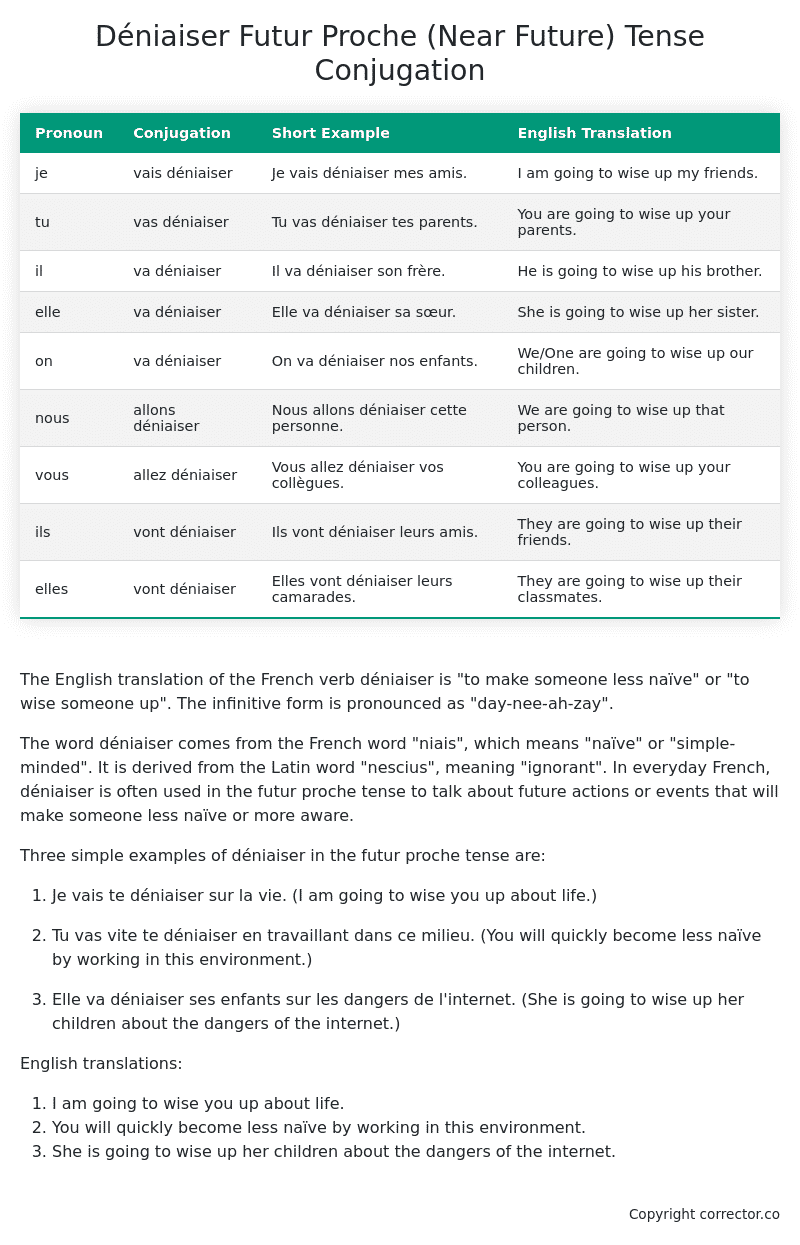Futur Proche (Near Future) Tense Conjugation of the French Verb déniaiser
Introduction to the verb déniaiser
The English translation of the French verb déniaiser is “to make someone less naïve” or “to wise someone up”. The infinitive form is pronounced as “day-nee-ah-zay”.
The word déniaiser comes from the French word “niais”, which means “naïve” or “simple-minded”. It is derived from the Latin word “nescius”, meaning “ignorant”. In everyday French, déniaiser is often used in the futur proche tense to talk about future actions or events that will make someone less naïve or more aware.
Three simple examples of déniaiser in the futur proche tense are:
-
Je vais te déniaiser sur la vie. (I am going to wise you up about life.)
-
Tu vas vite te déniaiser en travaillant dans ce milieu. (You will quickly become less naïve by working in this environment.)
-
Elle va déniaiser ses enfants sur les dangers de l’internet. (She is going to wise up her children about the dangers of the internet.)
English translations:
- I am going to wise you up about life.
- You will quickly become less naïve by working in this environment.
- She is going to wise up her children about the dangers of the internet.
Table of the Futur Proche (Near Future) Tense Conjugation of déniaiser
| Pronoun | Conjugation | Short Example | English Translation |
|---|---|---|---|
| je | vais déniaiser | Je vais déniaiser mes amis. | I am going to wise up my friends. |
| tu | vas déniaiser | Tu vas déniaiser tes parents. | You are going to wise up your parents. |
| il | va déniaiser | Il va déniaiser son frère. | He is going to wise up his brother. |
| elle | va déniaiser | Elle va déniaiser sa sœur. | She is going to wise up her sister. |
| on | va déniaiser | On va déniaiser nos enfants. | We/One are going to wise up our children. |
| nous | allons déniaiser | Nous allons déniaiser cette personne. | We are going to wise up that person. |
| vous | allez déniaiser | Vous allez déniaiser vos collègues. | You are going to wise up your colleagues. |
| ils | vont déniaiser | Ils vont déniaiser leurs amis. | They are going to wise up their friends. |
| elles | vont déniaiser | Elles vont déniaiser leurs camarades. | They are going to wise up their classmates. |
Other Conjugations for Déniaiser.
Le Present (Present Tense) Conjugation of the French Verb déniaiser
Imparfait (Imperfect) Tense Conjugation of the French Verb déniaiser
Passé Simple (Simple Past) Tense Conjugation of the French Verb déniaiser
Passé Composé (Present Perfect) Tense Conjugation of the French Verb déniaiser
Futur Simple (Simple Future) Tense Conjugation of the French Verb déniaiser
Futur Proche (Near Future) Tense Conjugation of the French Verb déniaiser (this article)
Plus-que-parfait (Pluperfect) Tense Conjugation of the French Verb déniaiser
Passé Antérieur (Past Anterior) Tense Conjugation of the French Verb déniaiser
Futur Antérieur (Future Anterior) Tense Conjugation of the French Verb déniaiser
Subjonctif Présent (Subjunctive Present) Tense Conjugation of the French Verb déniaiser
Subjonctif Passé (Subjunctive Past) Tense Conjugation of the French Verb déniaiser
Subjonctif Imparfait (Subjunctive Imperfect) Tense Conjugation of the French Verb déniaiser
Subjonctif Plus-que-parfait (Subjunctive Pluperfect) Tense Conjugation of the French Verb déniaiser
Conditionnel Présent (Conditional Present) Tense Conjugation of the French Verb déniaiser
Conditionnel Passé (Conditional Past) Tense Conjugation of the French Verb déniaiser
L’impératif Présent (Imperative Present) Tense Conjugation of the French Verb déniaiser
L’infinitif Présent (Infinitive Present) Tense Conjugation of the French Verb déniaiser
Struggling with French verbs or the language in general? Why not use our free French Grammar Checker – no registration required!
Get a FREE Download Study Sheet of this Conjugation 🔥
Simply right click the image below, click “save image” and get your free reference for the déniaiser Futur Proche tense conjugation!

Déniaiser – About the French Futur Proche (Near Future) Tense
Formation
1. Conjugate “aller” in the present tense according to the subject pronoun:
2. Add the infinitive of the main verb immediately after “aller.” For example:
Common Everyday Usage
Interactions with Other Tenses
Present Tense
Past Tense
Conditional Tense
Summary
I hope you enjoyed this article on the verb déniaiser. Still in a learning mood? Check out another TOTALLY random French verb conjugation!


